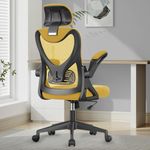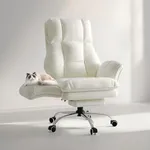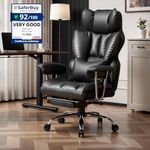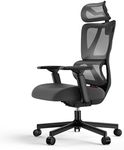Buying Guide for the Best Office Chairs
Choosing the right office chair is crucial for maintaining comfort and productivity during long hours of work. A good office chair should support your posture, be adjustable to fit your body, and be durable enough to withstand daily use. When selecting an office chair, consider how much time you spend sitting, any specific health needs you have, and the type of work you do. This will help you identify the features that are most important for your comfort and efficiency.ErgonomicsErgonomics refers to how well a chair supports your body, particularly your back, neck, and arms, to prevent strain and injury. An ergonomic chair is designed to promote good posture and reduce discomfort. Look for chairs with adjustable features like seat height, backrest angle, and armrests. If you spend long hours at your desk, prioritize a chair with comprehensive ergonomic features to maintain comfort and health.
AdjustabilityAdjustability is the range of modifications you can make to a chair to fit your body and preferences. This includes seat height, backrest tilt, lumbar support, and armrest positioning. A highly adjustable chair allows you to customize it to your specific needs, which is important for maintaining comfort and preventing strain. If you share your chair with others or have specific comfort needs, look for a chair with multiple adjustable features.
MaterialThe material of an office chair affects its comfort, durability, and breathability. Common materials include leather, mesh, and fabric. Leather is durable and easy to clean but can be less breathable. Mesh offers good ventilation, making it ideal for warmer environments. Fabric is comfortable and available in various colors and patterns. Choose a material based on your comfort preferences, climate, and aesthetic preferences.
Lumbar SupportLumbar support refers to the chair's ability to support the lower back, which is crucial for preventing back pain. Good lumbar support helps maintain the natural curve of your spine. Some chairs have adjustable lumbar support, allowing you to position it to fit your back perfectly. If you experience lower back pain or sit for extended periods, prioritize a chair with strong lumbar support.
Seat Depth and WidthSeat depth and width determine how well the chair fits your body. A seat that is too deep or too shallow can cause discomfort. Ideally, there should be a small gap between the back of your knees and the seat edge. The width should allow you to sit comfortably without feeling cramped. Consider your body size and shape when choosing a chair to ensure it provides adequate support and comfort.
Swivel and MobilitySwivel and mobility features allow you to move easily while seated, which is important for accessing different parts of your workspace without straining. A chair with a swivel base and smooth-rolling casters can enhance your efficiency and comfort. If your work requires frequent movement or reaching for items, look for a chair with good mobility features.
Weight CapacityWeight capacity is the maximum weight a chair can safely support. It's important to choose a chair that can accommodate your weight to ensure safety and durability. Most office chairs have a standard weight capacity, but if you require a higher capacity, look for chairs specifically designed to support more weight. Always check the manufacturer's specifications to ensure the chair meets your needs.

















